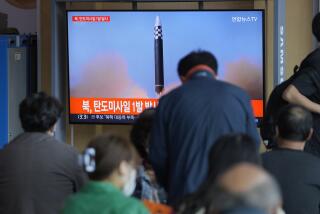Condemned to Repeat History : Persian Gulf: Calls for Japan to relax its constitutional ban on offensive arms could invite a return to military belligerence.
- Share via
Fulminations from Congress and President George Bush for a muscular Japanese presence in the Middle East conjures up George Santayana’s aphorism: “Those who cannot remember the past are condemned to repeat it.” By tacitly rebuking Japan’s constitutional ban on offensive arms or deployments as a mere pretext for evading its international Middle East responsibilities, the United States is encouraging a reprise of Japanese belligerence.
On Sept. 12, the House of Representatives voted 370 to 53 to commence withdrawing 50,000 American troops stationed in Japan unless that nation funds their full $7.4-billion annual cost. The vote expressed congressional resentment against the diminutive Japanese contribution to enforcing international sanctions against Iraq’s occupation of Kuwait.
The vote prompted Japan to boost its Middle East financial assistance from $2 billion to $4 billion, and to send medical personnel there. But Japan has resisted any direct military nexus with the cordon sanitaire around Iraq. It points to Article 9 of its 1947 Constitution, engineered by Gen. Douglas MacArthur, that renounces “the threat or use of force as a means of settling international disputes” and the maintenance of “land, sea, and air forces, as well as other war potential.”
A strict administration of Article 9 is indispensable to peace and stability in Asia and the Pacific. The United States is foolishly currying a menacing Japanese military juggernaut in these areas by urging a sweeping construction for short-sighted domestic political benefits.
Japanese traditions celebrate a sense of superiority over other peoples and international assertiveness. The 1894-95 Sino-Japanese War, the suzerainty over Korea from 1910 to 1945, the 1931 invasion of Manchuria and Pearl Harbor are illustrative. The Japanese have also eschewed a World War II peace treaty with the Soviet Union because of the former’s territorial claims to the Kurile Islands.
Japan generally treats its Korean population with disdain. Japanese textbooks repeatedly seek to gloss over the “Rape of Nanking” and mistreatment of Koreans during Japan’s prolonged occupation.
Japanese culture has resisted acceptance of war guilt for World War II; Japan declined vigorous prosecution of officials implicated in World War II atrocities in domestic tribunals, and, it did not exorcise from public life all collaborators with World War II militarists to strengthen attachment to democratic norms. In sharp contrast, post-World War II West Germany undertook steps to reinforce unequivocal renunciation of Nazism.
During the next decade, the United States will dramatically reduce or end its military presence in Japan, the Philippines and South Korea. The United States has already begun phasing out its 16,000 troop presence at Subic Bay Naval Base and Clark Air Base, and parallel reductions are scheduled in South Korea. Domestic demands in the United States for a balanced budget, coupled with the end of U.S.-Soviet military antagonisms, make such shrinking politically inevitable.
Simultaneously, Japanese self-defense forces, permitted under Article 9, will expand to counteract the U.S. shortfall. At present, Japan has the third-largest defense budget in the world, and possesses the technical sophistication and economic sinews to transform its forces into an offensive monster instantaneously. The Japanese political incentives for offensive armament are threefold: the recapture of the Kurile Islands, the domination of foreign nations holding resources vital to Japan’s economic colossus and military parity with its foremost and nuclear-armed Asian rivals--China and the Soviet Union.
Article 9 stands as a bulwark against worrisome global influences that are pushing Japan toward military boldness. It is penny-wise but pound-foolish for the United States to urge a relaxation of it to combat the short-term gulf crisis. Any glib evasion around the article would threaten a precedent that might haunt posterity and amity throughout Asia and the Pacific.
More to Read
Sign up for Essential California
The most important California stories and recommendations in your inbox every morning.
You may occasionally receive promotional content from the Los Angeles Times.










